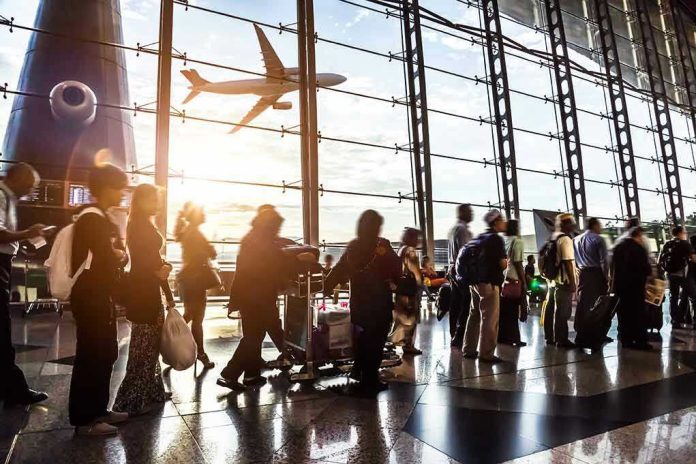
America’s airlines just dodged a billion-dollar bullet as the Trump administration shut down a sweeping Biden proposal that would have forced them to pay passengers cold, hard cash for flight delays—leaving travelers right back in the terminal, waiting and wondering if airlines will ever be held accountable.
Story Snapshot
- The Trump administration formally killed a Biden-era proposal that would have required airlines to pay passengers for controllable flight delays.
- The rule was scrapped before it took effect, preserving the current patchwork of voluntary airline compensation.
- The move highlights deep regulatory divides—consumer rights versus industry self-regulation—between administrations.
- Passengers lose the potential for standardized payouts, while airlines avoid new costs and compliance headaches.
Trump’s DOT Nixes Cash-for-Delays Rule Before Takeoff
The Department of Transportation, under President Trump, finalized the withdrawal of a major Biden-era consumer protection rule on November 14, 2025. The regulation, months in the making, would have forced airlines to pay stranded passengers anywhere from $200 to $775 for significant delays that were under the carrier’s control. Airlines and industry groups fought hard against the rule, warning it would saddle them with enormous compliance costs and operational headaches. The Trump DOT agreed, arguing the proposal represented unnecessary regulatory overreach and that airlines already had plenty of incentive to keep passengers moving.
Consumer advocates had cheered the Biden initiative as a seismic shift in passenger rights. The plan would have set a clear, federally mandated standard for compensation, echoing the European Union’s long-standing EU261 rules. But with the Trump administration’s reversal, U.S. air travelers remain subject to a confusing maze of voluntary airline policies and unpredictable goodwill gestures. The DOT’s official stance: more regulation won’t solve the chronic problem of flight delays, and it could even backfire by raising fares or reducing service options.
Policy Battles Revealed: Industry Costs vs. Consumer Rights
The Biden administration, led by then-Transportation Secretary Pete Buttigieg, launched the compensation initiative amid mounting public outrage over pandemic-era travel chaos and a surge in passenger complaints. The proposed rule aimed to end the era of apology emails and travel vouchers by mandating direct, cash payments for controllable delays. Industry pushback was swift and fierce. Airlines argued that the rule would force them to pay out on delays they couldn’t always control, escalate costs, and potentially drive up ticket prices for everyone. The Trump team, siding with the carriers, concluded that existing incentives and voluntary compensation were enough—and that government should step aside.
Unlike Europe, where passengers are entitled to standardized payouts for delays and cancellations, U.S. airline compensation remains a patchwork. The Biden rule would have closed that gap with a clear, universal standard. Instead, the rollback cements America’s outlier status, leaving frustrated travelers to navigate each airline’s unique—and often opaque—policies. For the airlines, the move delivers a win: no new payouts, no new paperwork, and the freedom to manage delays as they see fit.
What It Means for Passengers, Airlines, and the Future
In the immediate aftermath, airlines breathe easier, having sidestepped a costly compliance regime that could have forced them to shell out millions—or more—in delay compensation. Passengers, meanwhile, lose the promise of predictable, cash-on-the-barrelhead payouts for ruined travel plans. Instead, they’re left hoping their carrier will do the right thing, or at least offer a voucher and a smile. The deregulatory move also sets a precedent for future policy: if the federal government won’t step in now, will it ever? The decision is likely to fuel political debate as candidates spar over whether air travelers deserve stronger protection—or whether the free market should rule the skies.
Industry analysts warn that while regulatory burdens can drag down efficiency and drive up costs, the lack of standardization leaves consumers in the lurch. Some experts predict that without federal action, public frustration will only grow, and calls for new rules will resurface the next time airports turn into makeshift hotels for stranded travelers. For now, the status quo reigns. Airlines hold the upper hand, and passengers keep their fingers crossed. The only certainty: the next time your flight is delayed, don’t expect a check in the mail—unless you live in Europe.
Sources:
AirlineGeeks: Trump Admin Cancels Biden Plan to Reimburse Passengers for Delayed Flights
Fox Business: Trump Axes Biden Plan Would Have Forced Airlines Pay Passengers Cash Delays









